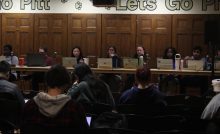Students share experiences intersectional experiences, discuss feminism, religion, race


Natalie Cheuk, a junior Political Science and Linguistics major, discusses her struggles of keeping her Chinese identity while moving to North Carolina at age 10. Kyleen Considine | Staff Photographer
After scrawling words like “empowerment” and “equality and opportunity” on colorful sticky notes, students stuck them to a large blank sheet of paper in Dining Room B of the Union Monday.
The prompt that elicited these responses: “What is feminism to you?”
About 12 students attended a discussion on intersectional feminism hosted by Panthers for UNICEF and the Hillel Jewish University Center of Pittsburgh at 4:30 p.m. Monday.
Intersectional feminism is specifically centered on diversifying the feminist movement — focusing on issues that affect women of all races and classes, disabled women and trans women, among others. The intersection of these issues across cultural boundaries formed the basis for Monday’s discussion, as well as the movement as a whole said anupama jain, part-time professor in the Gender, Sexuality and Women’s Studies program at Pitt.
“Intersectionality was an intervention that pointed out previous mainstream feminists and how other social justice advocates failed to notice how identities and systems of privilege are always multi-faceted,” jain said. “So, one cannot simply speak of gender or of race as if they are not intertwined and mutually influential factors in individual and national lives.”
It was a specific interest in intersectionalism that brought together President of Panthers for UNICEF Gabrielle Arguello-Abramson and Israeli fellow Elina Lipov of Hillel JUC in Jerusalem. Lipov — whose job includes informing Hillel members about Israeli culture — and Arguello-Abramson were both in Israel while women’s marches were breaking out in cities across the United States.
The pair struck up a conversation over coffee about intersectional feminism and decided that upon returning to the United States, they would involve students from various backgrounds in a discussion on womanhood — and its intersection with race and religion — in various cultures.
“That’s one of the things I like about the intersectional word being before feminism is that we’re all fighting the patriarchy,” Arguello-Abramson said.
The women’s marches — which received scattered criticism for being largely focused on white women’s feminism — have fostered discussions on intersectionality for many.
Accusations of white feminism on Facebook prompted a group to form in opposition to the Pittsburgh Women’s March on Jan. 21. The second march was called the Our Feminism Must Be Intersectional Rally.
Feminist makerspace Prototype focuses specifically on creating a space for intersectional feminism and opened in the city Feb. 1. Prototype’s founders Erin Oldynski and E. Louise Larson also plan on hosting community discussions on the topic.
The post-it note activity followed an opening statement from Arguello-Abramson and Lipov. The hosts then encouraged other attendees to share personal stories.
One of the first to speak was Natalie Cheuk, a junior political science and linguistics major, who talked about her experiences as an Asian-American woman. She moved to the United States when she was 10 years old, and although she was old enough to understand social cues, she struggled to find a place amongst classmates.
“I didn’t feel like I was American enough. ‘Was I Chinese or was I American?’” Cheuk said.
Eventually, she came to the conclusion that she and other Asian-Americans shouldn’t have to choose — they can be both.
“Now I’m like a leader, and I feel proud that I’m Asian-American,” Cheuk said.
In addition to race, individuals such as Rachel Rudnicki, a sophomore studying neuroscience and psychology, talked about their various struggles with religion.
“I felt like there was a sign hanging over me, ‘Not a real Jew — I’m an imposter,’” she said.
She recalled a particular incident when a Jewish classmate moved to her school who practiced Judaism more loyally than she did. The new classmate had a bat mitzvah and engaged in a lot of what a “real Jew” typically is expected to do — like traveling to Israel to learn about the culture or having extensive knowledge about the Torah. This made Rudnicki question whether she was “Jewish enough” in comparison. After joining Hillel and finding people similar to her, Rudnicki, like Cheuk, came to a realization.
“[If] you are Jewish, don’t let somebody tell you you’re not,” she was told at one point by a member of Hillel.
The event concluded with a conversation about feminists’ portrayal in society. Lipov said feminists are often stereotyped as angry, loud protesters, but that’s not true since there are different types of feminists in the world.
“It’s like fifty shades,” she said. “You don’t need to be radical … For me, being a feminist is being a leader in my own way.”
Recent Posts
Pitt men’s basketball navigating transfer portal difficulties
Pitt men’s basketball is like any other team in the world of large NIL deals…
Column | Pirates shouldn’t rush David Bednar back to Pittsburgh
David Bednar’s career arc has taken a turn for the worse over the last 12…
Photos: Pitt Small Jazz Ensemble
Pitt Small Jazz Ensemble performed in the Bellefield Hall Auditorium on Tuesday, April 15. [gallery…
Photos: Pitt Volleyball vs Ohio State
Pitt Volleyball defeats Ohio State University 3-0 at the Fitzgerald Field House on Saturday April…
SGB addresses concerns about ICE presence on campus, hears SJP lawsuit against administration, approves governing code bill
At its weekly meeting on Tuesday at Nordy’s Place, Student Government Board heard concerns about…
ACLU of Pennsylvania sues Pitt over SJP suspension
The ACLU of Pennsylvania filed a federal civil lawsuit against the University of Pittsburgh and…

